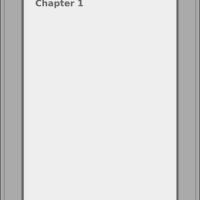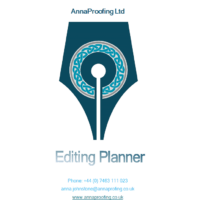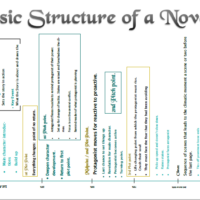
by Anna Johnstone | Nov 28, 2017 | Advice, Blog, Service
A sample edit is an indicator of many things; the professionalism and ability of the editor is only one factor. The sample indicates the level of the work to be undertaken and it allows the editor to asses pricing but did you realise it also shows the editor the level of respect they hold for the skills of the editor?
These did not develop overnight and it is not something that just everyone can do. In the last fourteen months, I have lost count of the number of sample edits I have completed. Some of them took me a whole morning and others took me the best part of a day, depending on the amount of work that needed to be done.
‘But why should authors pay for what they can get for nothing?‘
The reason to pay for samples is two-fold.
First. Refusal to pay for sample edits signal, at least in part, an expectation that editors are automatically obligated to give up their time, and should be grateful for every scrap of attention an author puts their way. Given that this is an attitude that many of us in the creative industries have to explain when companies and individuals want to pay us in ‘exposure’ and think that the satisfaction of completing the work should be its own reward, it saddens me when we have to deal with this from other creatives. The willingness of an author to pay for a sample edit is a clear indication that they acknowledge that your time is as valuable as the skills they want to employ. It says ‘I understand there is a person at the other end of this email who is working hard to make a living, and they deserve to be paid fairly for the work they put in‘. It tells the editor a great deal about the author: remember they are assessing the author every bit as much as the author is evaluating them. Simply put, it’s a matter showing respect between author and editor.
Second. Many service industries charge a call out fee to cover the time it takes them to assess the work in question, and a sample edit is no different. You would not expect a plumber, cleaner, gardener or electrician to come to your home or to give up a morning of their time for nothing. In my view, creative services are no different. The sample fee implies the level of commitment of that potential client. Even web developers charge a consultation fee, This is not to say that editors should not offer free samples if they so wish, only that you should not be put off when editors do charge for their sample edits. By ignoring the editors who don’t offer free samples you could be depriving yourself of an opportunity. What you have found is not a ‘greedy editor‘, but a confident and skilled professional who knows the value of both their skills and their time.
by Anna Johnstone | Sep 25, 2017 | Advice, Service
A lot is said about how to find the right editor for you but today’s post is about being a good client. I had not intended for this to be this week’s post but given the circumstances, I thought this needed to be said.
Most of us know by now that the business relationship runs both ways. It should be one of mutual benefit and courtesy. Most of you know you need to be polite to editors when introducing your work, and they know to be tactful and treat your work with respect and discretion. Most of you know that most editors are very busy and cannot simply drop everything to make your work an immediate priority, but we still try to be polite when dealing with even the most ‘urgent’ projects. However, there are times when we meet those who don’t know these things, and today was one of them. I would like to draw from my own experience for an example of how not to introduce yourself to an editor. I will not name names. Doing so would be unprofessional and serve no purpose other than to exacerbate the problem, However, I do not feel that ignoring this experience will do any good either. For the moment there are two things authors need to remember;
- Good customer service does not mean being a doormat and accepting poor treatment just to get the client. Good customer service requires effort on behalf of the client too.
- Editors talk… A lot… About everything…
A few days ago I received an unsolicited ‘friend’ request from a member of one of the many writer’s groups I am a part of on Facebook. Recognising the name and thinking it’s about editing as it came on that profile, I accepted it and sent an invitation to my editor’s page to let them know it is there. This is not the same as a ‘request’ and people are free to decline it. I had thought nothing of it since given that my service has been closed for the last few days following the sudden death of my father. It strikes me that if he had really read my page he would have seen my pinned post. I digress…
Today I have experienced possibly the worst example of entitled behaviour since I started fourteen months ago. I arrived at my page to check my messages to find a personal message (not to the page, but to me personally) to say that they had liked my page and would I now like theirs “Only if deserved”. I didn’t get a chance to tell them that I was rather busy and would take a look when I had time because when I gently pointed out that my service page does not engage in like-swapping he began hounding me to just follow the link to his page and hit ‘like’ (even the most technologically naive of us should know not to ‘just follow’ any link.) just because he had liked mine. He had not used my service or put work my way so I am surprised he did. When I told him his behaviour to me was aggressive, he threw a tantrum that would have embarrassed Super Nanny; accusing me of spamming him, even though I explained that the invitation was only that; an invitation, and telling me not to buy his book. At no point did I say I would not like his Facebook page, but I was not given the opportunity to say that I would take a look when I had time because I was blocked before I could and simply because I would not drop everything and give him exactly what he wanted when he wanted it. He wanted me to like his page as an endorsement to his work without ever having read it.
In a way, I am sort of glad that this client has exposed his nature as a difficult client before I had to deal with him. This person is not the type of client this service is looking to engage with. Nor will it be. Ever. What did he do wrong, you ask? Firstly he assumed that he had an automatic right to my time and attention and that I should be grateful for his and jump to his will. It would take me time to go to his page and read his work. Time that I just don’t have this week. Yes, his primary introduction was fairly polite but his tone and demeanour changed to one of affronted aggression the moment things did not begin to happen exactly as he would like. That was his second mistake.
Remember, that editors are more than merely a living spell checker. We have lives and we have self-respect and we talk to each other. We know who the merely difficult clients are. We also know who the ones to avoid are. This is the beauty of being a freelancer. We have the privilege of choosing who we deal with. Imagine he had behaved that way to waiting for staff or someone at a call centre who did not have that option? It is not okay to treat anybody that way and if the cost of not putting up with it means one less rude or difficult client then that price is worth it.
by | Feb 9, 2017 | Advice, Blog, Service
This is just a quick note to readers to let you know that I haven’t forgotten you. For the last two weeks, I have been lagging under the weight of a really nasty flu bug and yesterday was a really bad day, and it’s on that note that I write this post.
Let yourself have a break. Nobody is going to sack you and tell you to clear your desk you for not feeling up to it. Writing should not be a chore we have to force yourself to do no matter what. If it is, then you are doing it wrong. I’m guessing, due to the fact that you are reading this, that you are creative people. That creativity is not going to fade because you took a day off to recover from being ill, or you had to look after a poorly child. So if you need to, take a step back, do what you need to do to enable you to be able to come back with a fresh head and enjoy what you are doing.
One of the first stages of Harry DeWulf’s Readworthy Fiction Course (Fab course. I highly recommend it.) is to look after your personal comfort and finding the best set up for you to write in. To me, this includes allowing the writing process adequate head space. If you have a list of stuff that you have to do niggling in the back of your head? You are not comfortable. Go do that stuff, get it out of the way, and use the boring housework time to think about your story. Some of my favourite ideas have come while clearing up Lego (I have 3 boys under 8, therefore I am doomed to do this for at least the next ten years). If you are full of cold and feeling rubbish? Don’t even try to do more than scribble down ideas. You are best off looking after yourself. Have a bath, dose yourself with hot tea and cold cure and, as Joanna Penn would say, do something to “fill that creative well“, (I love that phrase). Believe me, trying to write with diminished concentration will not do your work any favours.
Look after yourselves. With any luck, I will be back to feeling up to writing two posts a week from next week. Thank you for your patience.
by | Dec 29, 2016 | Blog
Two more days left of 2016, and it has been quite an eventful year. In the latter half of this year, I not only finished my degree but have taken a somewhat, though not wholly, unexpected turn in my plans, career wise. It’s also about this time of year where I give myself a self-audit regarding where I am, where I want to be and how I plan to get there. Don’t worry I am not going to drop everything and start backpacking around Asia or something. Travelling is simply not feasible…yet. The other reason is that I would rather spend the money on my kit for Viking re-enactment.
I knew from the age of around 15 that I wanted to do something involving writing. Sadly, I allowed my parents and teachers discourage me. To cut a long boring story short, I am getting another crack at the whip. When I began my studies in February of 2011, I had my heart set on teaching History in a classroom setting. I got keener as I progressed but in the last year or so I have been considering my Plan B options: Open University grading policy has meant that my results were not what I needed them to be to get on to any of the training courses. I had certainly not seen myself as a self-employed Freelancer I cannot say that it wasn’t a disappointment because the same results from a ‘brick’ university would have got me a 2:1 or even a first, but what’s done is done. I still managed it while looking after 3 kids, so yay me. I am sure my sleep patterns will recover soon, and this (theoretically) lets me off taking my maths GCSE. Again (shudder). That said, I am thinking of taking it anyway just so I have that apparently necessary C that I have managed quite happily without for the last 16 years. I am yet to find a practical use, in my field, for knowing how to calculate the area of a circle.
A suggestion from a fellow editor made me give editing and proofreading a go and I am glad I took him up on his advice. I love it and have since set myself up as a freelancer. This means I have the freedom to set my own hours. It has also taught me that I not only need to learn when to stop working and think about something else for a while but actually do it. Looks like I have a New Year’s resolution to keep for next year. I am feeling extremely positive about this new direction. It’s a teaching role (of sorts), just the one I was expecting and I will get to use all my skills.
NaNoWriMo was an eye-opener, to say the least. I gave it a good shot, but I then ended up with a beta-read that I couldn’t turn down. Next year I’m going to make sure I schedule enough time to do my own writing. I have an idea lined up but I have a strict ‘no spoilers’ rule. It will give me plenty of time to finish the first draft of this month’s, edit and get it ready for publishing. I’m really excited about this too. NaNoWriMo gave me the boot up the bum to make a real start on it. The Densewords ‘Readworthy Fiction’ course (available via Udemy) is also proving to be a massive help where printed writers’ guides were not. I would recommend it to any author.
Finally, 2017 will be the year I get my driving license. I have procrastinated for long enough. I will be 36 in April and have decided that now it’s time to stop being a massive wussy and do it.
To-do-List for 2017.
- Finish first-draft of my first novel, (for publishing in December 2017)
- Learn to drive
- Retake maths (yuck)
- Learn when to stop.
Call to action!
What are your top four priorities for 2017?
by | Nov 24, 2016 | Blog, Courses
Rayne Hall, for those not familiar with her, is a horror writer but she also writes some very helpful writing-guides. The subjects of these vary between marketing ideas, advice on how to write specific scenes, and how to self-edit (all very helpful to new writers or those who fancy a change of genre). You’ll still need an editor. Even editors use editors.
Now she is offering a free workbook when you sign up to the mailing-list. Be aware that it might take a day to come through so make sure you have the email address (from the confirmation) on your safe-senders list or it will end up in the junk file.
What is it?
This is a twenty-six-page collection of fifteen individual writing exercises, aimed to develop your own voice within your existing work. These exercises are very helpful and will aid you in your self-editing process. By all means allow your favourite authors to influence your work, there is even an exercise to pick your top five (harder than you think to narrow down: I came up with ten on the spot), but the idea is to emulate, not imitate. This will be a great help to new writers, and those who want to improve their work.














